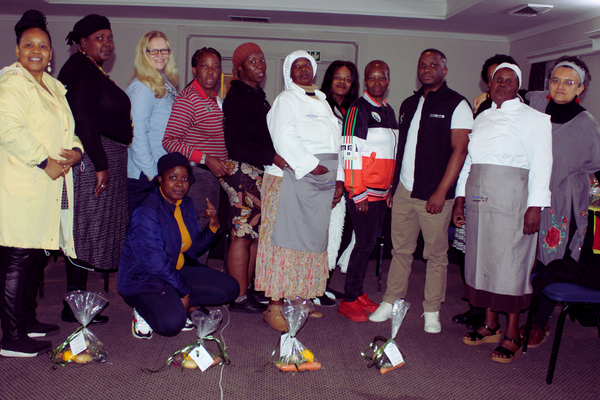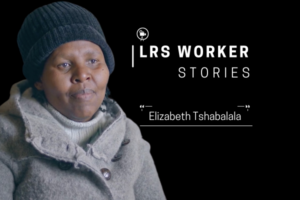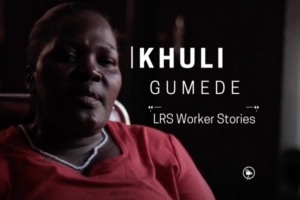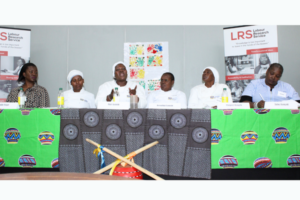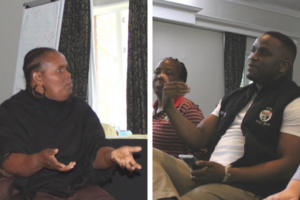Introduction
One of the aims of The Labour Research Service (LRS) is to support the struggles of women workers in all forms of employment. We recognise that many women workers are struggling to hold onto jobs that are increasingly being informalised.
Recruiting women as volunteers has become another way of pushing women into unrecognised and poorly paid work.
In South Africa we have a National School Nutrition Programme (NSNP). This is a state funded social protection program intended to improve the nutrition, development and learning of millions of school children from disadvantaged communities. Mothers of children in schools are recruited to prepare and cook meals for over 9.6 million learners across schools in the country. They are called Volunteer Food Handlers and this is one example of recruiting women as volunteers into what should be formalised work.
Millions of children are dependent on the food prepared by the Volunteer Food Handlers, yet this job that forms part of a very important state intervention to alleviate hunger and prevent malnutrition – is not recognised as work. Is this because the work of the Volunteer Food Handler is regarded as and extension of women’s role? The work that women perform in the home like cooking, cleaning and caring for children is not recognised as work therefore not valued. When this work is done in the school it seen as a continuation of a woman’s role and for that it is seen as voluntary work and not formal employment.
Recognising and valuing the work that women do both at home and in places like schools is part of the LRS gender equity mission. It is for this reason that we have joined hands with partners across the world in an initiative called Power Up. The Power Up! Initiative that started in 2021, is a broad international initiative involving women’s rights organisations and networks in 17 countries. Together we build, organise, mobilise and transform power of three strategic agendas: bodies, voices and resources.
LRS PU Initiative
The LRS Power Up! initiative aims to advocate for the right of Volunteer Food Handlers to fair and decent work that is valued in a laudable community-centred National School Nutrition Programme (NSNP).
In the past two years the LRS has met with groups of Volunteer Food Handlers in four areas of Gauteng to understand the dreams and challenges of food handlers.
Working with food is one of my favourite things to do. I used to work in the kitchen at Spur before getting this position. COVID forced our restaurant to close, so I applied. I was thankful for the opportunity to earn some money.
View of a Volunteer Food Handler (LRS Discussion Forum, 2021)
Through many conversations and workshops, a group of food handlers committed to strengthening the visibility and value of food handlers in the NSNP has emerged. This has strengthened our resolve as the LRS to broaden the initiative into a campaign for recognising the work that the Volunteer Food Handler plays in the NSNP as formal work and not volunteering. For such a campaign to emerge we need many stakeholders to see and hear the Volunteer Food Handlers speak about the nature of the daily work they do in feeding millions of school learners nationally. We need to hear about the challenges they face like the lack of clean running water and electricity for cooking and cleaning and the absence of proper cooking facilities and utensils.
We could start earlier if we were able to but because we only have one three-plate stove on which to prepare six pots. Only three pots can be placed at a time. Another issue is that we are not permitted to enter the storeroom. We are held responsible for late meals. There's no urn.. Boiling the water takes time since we use pots. We even contribute as a group and purchased our own urn to speed the boiling process and avoid being late.
~ View of a Volunteer Food Handler (LRS Discussion Forum, 2021)
Volunteer Food Handlers speak about how they are expected to keep alive a programme as important as the NSNP while they have no representative voice with the Department of Education or even at a school level.
As food handlers, we have no voice. Fear is what drives us. We are told about the favour we received when we are hired. We are threatened with dismissal if we disagree or ask too many questions. Particularly when the district comes to visit and we seek clarification. The coordinator's job must always be defended, but no one defends ours. I was told every other day that I had been chosen because I was struggling. This silenced me since I didn't want to appear as if I didn't appreciate the favour.
~ View of a Volunteer Food Handler (LRS Discussion Forum, 2021)
The work food handlers do is invisiblised, ignored and taken for granted by Government and many times by educators, learners and the broader community.
Maintaining discipline and respect in high school is difficult. It's not ideal to be disrespected by a student your child's age. I'll never forget the day the school bully went into the kitchen and demanded crates of milk, which we were supposed to serve with pap on that particular day, according to the menu. He offered them for sale throughout the area. He wielded a knife at us, we felt powerless and we were unable to stop him.
~ View of a Volunteer Food Handler (LRS Discussion Forum, 2021)
The food handler has no rights and is expected to be grateful for earning a stipend which cannot even be compared to the national minimum wage of R25,42 per hour as there is no clarity of the number of hours volunteer food handlers are on duty for – clearly a case of perpetuating the idea that ‘women’s work is never done’.
Building a campaign to recognise and value the work of the Volunteer Food Handler
As union activists we are also educators, parents and community members concerned about the wellbeing of our children.
Union activists as educators
As educators the meals provided through the NSNP is important for creating healthy active learners. It is difficult to concentrate and learn when you are hungry or malnourished. A child who receives a nutritious meal is more likely to be alert, responsive, and eager to participate in the classroom. Nutritious food supports learners’ ability to learn! As the economic crisis in our country intensifies, more and more families are going to bed hungry. For many children, the meal they receive at school through the NSNP is their only nutritious meal for the day and it is the volunteer food handler who is responsible for preparing that meal.
Union activists as parents
As parents putting food on the table regularly has become increasingly difficult. Mothers in particular often feel very anxious when they cannot provide regular meals for their children. Knowing that your child can have a regular, balanced and nutritious meal through the NSNP can be very reassuring for parents – and it is the volunteer food handler who is responsible for preparing that meal.
Union activists as community members
As a community member knowing that the children in your community is thriving both physically and intellectually is very important and a balanced and nutritious meal is key to a healthy mind and body and it is the volunteer food handler who is responsible for preparing the meal.
Trade unionists supporting Volunteer Food Handlers who are the ‘heart and hands’ of the NSNP
Union activists are concerned with the rights and well-being of all workers and across all workplaces. For Government, the NSNP is lauded as a flagship program fighting poverty. Yet the workers who prepare and cook the meals feeding millions of children in schools across the country are categorised as volunteers and paid a stipend.
The International Labour Organisation defines volunteer work as: ‘’activities performed willingly and without pay to produce goods or services for others outside the volunteer’s household or family”.
Key to the notion of volunteerism is that whoever volunteers does it out of choice, meaning they can join or leave at will. However, we need to question the idea that the volunteer food handler ”chooses’’ to volunteer. For many people working as volunteer food handlers it is an imposed survival mechanism. This means receiving even a stipend can assist with putting food on the table.
There is also the notion that the women who cook the food in the NSNP should not be concerned with a monetary return for their labour as volunteering means donating your time and energy without receiving financial or material gain – so the work in the case of the volunteer food handler is perceived by society as a ‘’labour of love’’ freely given. Yet it is usually only women who are expected to perform this ‘’labour of love’’ or what we can aptly describe as unpaid or underpaid labour. We need to acknowledge that women receive very little in return for this ”labour of love”. In the case of the volunteer food handlers, difficult working conditions, a small stipend and lack of recognition as workers only further entrenches the notion that care work or the ‘’labour of love’’ can easily be used to devalue women’s contribution to society.
What this ‘labour of love’ actually looks like
Volunteer food handlers have contracts or memorandum of agreements signed by representatives from the provincial education departments. There is no uniformity as regards stipends or conditions of service across provinces but there are some general responsibilities that includes:
- Managing the kitchen and storage facility according to relevant legislation which includes receiving groceries and perishables and ordering gas refills
- Cleaning the storage room, kitchen and utensils both in the morning and afternoon
- Preparing and serving food as per prescribed menu while practicing food safety and hygiene
- Assisting and guiding learners with practicing cleanliness
The Volunteer Food Handler reports to a delegated educator, signs a daily attendance register and is encouraged to find a substitute if she is not able to come to work.
Notwithstanding all the responsibilities outlined above the contract makes it clear that the Volunteer Food Handler is not an employee of the school or the Department of Education and that neither the School Governing Body nor the school assumes any liability for injuries the volunteer food handler might incur emanating from her voluntary activities at the school. There is also no mention of the number of hours the volunteer food handler is expected to be on duty, except to say that she will start work in the morning and complete her work after cleaning in the afternoon.
For all of this the volunteer food handler can receive stipends as low as R1270 monthly depending on the province she is based in.
So even after signing a contract where huge responsibility is placed on the food handler, she remains a volunteer at the mercy of whoever has been appointed to coordinate the NSNP at the school level.
I signed the agreement but I would have loved to take the contract home and ask others in my community to help understand it. We never received a copy. Even though I knew that I could get a copy, I was too scared to ask for it. I thought the coordinator would think I do not trust her. The signing went very quick and I was too scared to ask a lot of questions because I felt lucky to make the list knowing the number of people who applied.
~ Volunteer Food Handler
The food handler has no rights and is expected to be grateful for earning a stipend which cannot even be compared to the national minimum wage of R25,42 per hour as there is no clarity of the number of hours volunteer food handlers are on duty for – clearly a case of perpetuating the idea that ‘women’s work is never done’
Resource [PDF] Volunteer Food Handlers: The hands and heart of the National School Nutrition Programme
LRS Power Up initiative: Advocacy tools
A day in the life of a Volunteer Food Handler
Experience a day in the life of Khuli Gumede, a Volunteer Food Handler with the National School Nutrition Programme (NSNP), as she goes about her daily routine. Khuli is one of more than 60,000 Volunteer Food Handlers who prepare and serve meals to learners in the programme. As we delve into Khuli’s journey, we uncover the realities faced by Volunteer Food Handlers. These remarkable individuals, predominantly women and mothers of the children in the schools they serve, have multifaceted lives beyond their role. Despite their significant contributions, they are often unseen, undervalued and unpaid as workers.
Jabula song
Developed with a core group of Volunteer Food Handlers, Jabula song is an advocacy tool in our campaign to recognise and value the work of Volunteer Food Handlers. The word Jabula means to rejoice, to be happy. The song expresses the commitment and passion of Volunteer Food Handlers in the National School Nutrition Programme to ensure that all learners have access to the nutrition they need to thrive in school.
Access Denied: A woman worker’s struggle for social protection
In this video, we uncover the stark realities of Elizabeth and Lehlohonolo, two working-class people who face an extraordinary challenge – accessing their Unemployment Insurance Fund (UIF) benefits. Their stories highlight the devastating impact of the informalisation of work on women workers, particularly accessing social protection.
Elizabeth, a former Volunteer Food Handler, is still waiting for the money she’s entitled to, and she’s not alone. Thousands of other former Volunteer Food Handlers employed under the National School Nutrition Programme share her struggle to access their UIF benefits.
LRS Power Up! Nutrition Series
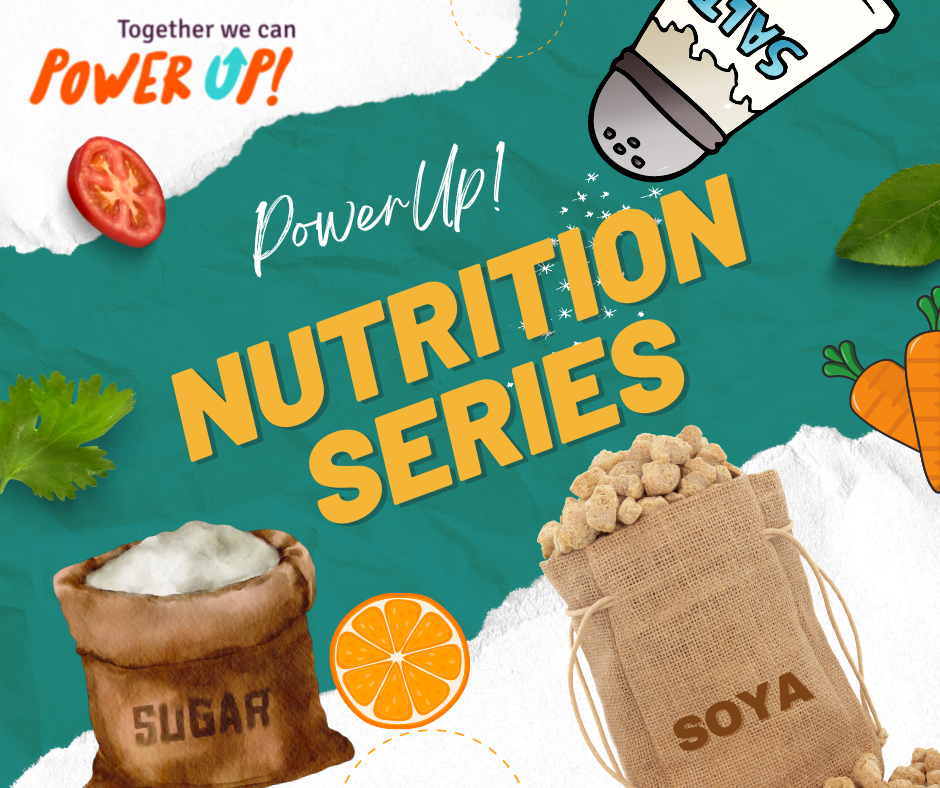
The Power Up Nutrition Series
The Power Up Nutrition Series comprises a set of eBooks exploring the links between food and nutrition. The eBooks can assist school communities and trade union activists looking to promote and support healthy nutrition and Volunteer Food Handlers in the National School Nutrition Programme.

